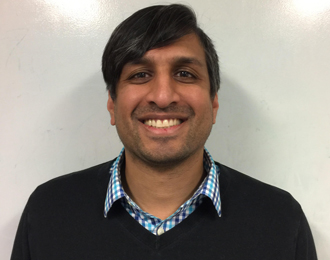ECHO program helps far-flung health-care workers treat complex addiction cases

By Mary Dickie

Dr. Wiplove Lamba
An innovative skills-building program developed by a St. Michael’s physician uses teleconferencing to allow primary care providers, case managers and health-care workers across the province to build capacity in substance use care with the help of specialist experts.
Inspired by a model at the University of New Mexico, Dr. Wiplove Lamba, a staff psychiatrist at St. Michael’s, designed ECHO Ontario Addiction Medicine and Psychosocial Interventions (ECHO Ontario AMPI) in collaboration with the Centre for Addiction and Mental Health (CAMH). The program consists of 26 weekly teleconference calls that include a lecture on an aspect of addiction care, followed by a discussion of the participants’ individual cases. The aim is to improve the quality of care for patients seeking treatment for addictions and related disorders, especially in rural and underserved areas, while reducing the need for specialist visits.
“To deal with the substance use problems we have around the province, it’s going to take more than what we’ve got now,” Dr. Lamba says. “This program will give primary care providers increased capacity to help their patients.”
The ECHO (Extension for Community Health Outcomes) model is a hub-and-spoke network in which experts conduct virtual clinics with community providers in remote locations. It was created in New Mexico by Sanjeev Arora to help hepatitis patients forced to travel to receive treatment because there were no specialists in their area. A study of that initial project published in the New England Journal of Medicine found that the patients being treated by their primary care provider in their own community were actually doing better than the ones who travelled to get care from the specialists.
“That makes sense, because people tend to do best in their home environment,” says Dr. Lamba. “So we did a pilot at St. Michael’s where we ran about 10 sessions on our own, and then we partnered with CAMH to create a 26-part program to train primary care providers, case managers and nurse practitioners on how to best provide care for their addiction patients. So say you’re in Thunder Bay and you’re seeing a lot of people who use substances and you’re not sure how to help them. You can log in once a week, and over the course of 26 weeks you can learn skills and present some of your own cases as well.”
Dr. Lamba said his own participation in a previous ECHO program on pain gave him a new perspective on his practice. “Working in psychiatry and addiction, I see a lot of people with chronic pain, and a lot of people with poorly treated chronic pain,” he says. “I attended the ECHO pain program for a year to learn new skills, and it was fantastic. I heard about a different case every week from all these different people, and when I was done I had some new ways to deal with pain.”
The ECHO Ontario AMPI launched last April with an expert hub consisting of Samantha Szilagyi, Jean-Paul Michael and Dr. Lamba from St. Michael’s, and Nitin Chopra, Katia Gouveia, and an operations team from CAMH. The participants were based across the province and included family physicians, community health workers, nurse practitioners, social workers, pharmacists and others.
A recent progress report on the project, which concludes in December, found a high rate of satisfaction among the session participants, who valued input from their peers as well as the experts.
“The great thing about it is that it’s creating this community of practice,” says Dr. Lamba. “A lot of professionals are trying to build skills, and this helps them do that. Anybody can take a two-day workshop, but when you are doing something regularly, and you’re hearing about and applying other skills, that really resonates and sticks with you.”
About St. Michael’s Hospital
St. Michael’s Hospital provides compassionate care to all who enter its doors. The hospital also provides outstanding medical education to future health care professionals in more than 29 academic disciplines. Critical care and trauma, heart disease, neurosurgery, diabetes, cancer care, care of the homeless and global health are among the Hospital’s recognized areas of expertise. Through the Keenan Research Centre and the Li Ka Shing International Healthcare Education Centre, which make up the Li Ka Shing Knowledge Institute, research and education at St. Michael’s Hospital are recognized and make an impact around the world. Founded in 1892, the hospital is fully affiliated with the University of Toronto.
St. Michael’s Hospital with Providence Healthcare and St. Joseph’s Health Centre now operate under one corporate entity as of August 1, 2017. United, the three organizations serve patients, residents and clients across the full spectrum of care, spanning primary care, secondary community care, tertiary and quaternary care services to post-acute through rehabilitation, palliative care and long-term care, while investing in world-class research and education.
